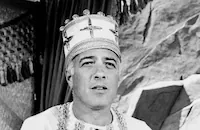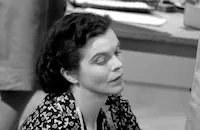Gunman's Walk

Brief Synopsis
Cast & Crew
Phil Karlson
Van Heflin
Tab Hunter
Kathryn Grant
James Darren
Mickey Shaughnessy
Film Details
Technical Specs

Synopsis
Davy Hackett and his older brother Ed arrive at an Indian agency in search of extra hands for their upcoming horse drive to Jackson City, Wyoming. Davy defends the beautiful Cecily "Clee" Chouard from his brother's disrespectful advances, and as he talks with her, he begins to fall in love. The two brothers hire two full-blooded Sioux Indians, Black Horse and Blue Eagle, along with Clee's brother Paul, who like his sister was born to a Frenchman and his Sioux wife. Back at the Hackett ranch, Davy and Ed's father Lee reminisces with his friend, Bob Selkirk, about the days when they tamed the vast territory with their strength and guns. Lee insists that his sons continue to wear guns, but Davy protests that there is no longer any need to do so. Ed, who is as wild and proud as his father, however, enjoys displaying his prowess as a gunman. Determined to be considered the best horseman in the territory, Ed becomes upset when his father remarks that Paul is also good with horses. One day, Ed resolves to rope a beautiful white mare that has always eluded his capture, and soon, both he and Paul are racing along a steep cliff in pursuit of the horse. As Black Horse and Blue Eagle watch in horror, Ed, in attempting to charge ahead of his rival, pushes Paul over the cliff to his death. Ed describes Paul's death as an accident, but when Davy rides to the Indian agency to deliver the news to Clee, he learns from agent Purcell Avery that the two Sioux have charged Ed with murder. Meanwhile, Lee arrives in Jackson City with a large herd of horses. Openly disapproving yet secretly proud of Ed's behavior, Lee defends him when he learns about the murder charge. At the hearing, the judge, another of Lee's old cohorts, is about to charge Ed with murder on the testimony of the two Indians when an unknown horse trader named Jensen Sieverts suddenly claims that he saw Paul accidentally fall from the cliff. Later, Sieverts admits to Ed that he hopes to take some of Lee's finest horses with him when he leaves town. Lee asks Davy to keep an eye on Ed that night, but Ed, jealous of his father's legendary reputation, angrily dismisses his brother and is later arrested for drunkenness and fighting. He is furious when Lee bails him out. Davy visits Clee and declares that he wants to marry her, and despite the pain his family has caused her, she accepts his proposal. The next day, as Lee looks on glumly, Sieverts selects ten horses from his herd. Upon learning that the horse trader has taken his white mare, Ed shoots Sieverts in the middle of Jackson City's main street. At first, Ed refuses to surrender his gun even to his father, but finally allows himself to be jailed while protesting that he was right to shoot a horse thief. Lee quietly threatens to kill the wounded horse trader if he reveals the truth about Paul's death. Meanwhile, Ed kills the unarmed deputy and escapes into the countryside. Lee tries to find his son before the angry townspeople catch him, but Ed, hiding in the rocks, sees him approaching and threatens him with a gun. Ed complains that Lee did nothing but boast about his killings over the years. The older man admits his mistakes but declares, "I'll see you dead before I let you kill another man." The two men draw their weapons, but Lee is faster and Ed falls. Lee immediately drops his holster and gun and holds his son's lifeless body in his arms. Back in town, Lee asks Davy and Clee to accompany him and Ed's body back to the ranch, then breaks into tears. Davy and Clee support him, and the three walk toward their horses.

Director

Phil Karlson
Cast

Van Heflin

Tab Hunter

Kathryn Grant

James Darren

Mickey Shaughnessy
Robert F. Simon

Edward Platt

Ray Teal
Paul Birch
Michael Granger

Will Wright
Chief Blue Eagle
Bert Convy
Paul E. Burns
Paul Bryar
Everett Glass

Dorothy Adams
Harry Antrim
Ewing Mitchell
Joseph Hamilton
Bek Nelson
Peggy Whitman
Shirle Haven
Judy Cannon
John Cason
Walter La Rue
Jack Barry
Allen Pinson
Wayne Burson
Brett Halsey
Sam Flint
Watson Downs
Wheaton Chambers
Charles Heard
Pierce Lyden
Hal Taggart
Alan Reynolds
Irving Mitchell
Robert Malcolm
David Mcmahon
George Lewis

Russell Thorson
Gloria Victor
Constance Cameron
Lucille Vance
Crew
Clay Campbell
Lambert Day
George Duning
Ric Hardman
Helen Hunt
Henri Jaffa
Fred Karger
Fred Kohlmar
Charles Lawton Jr.
John Livadary
Arthur Morton
Sam Nelson
Frank Nugent
Robert Peterson
Richard Quine
Morris Stoloff
Jerome Thoms
Frank A. Tuttle

Videos
Movie Clip



Trailer
Film Details
Technical Specs

Articles
Gunman's Walk
Gunman's Walk is a western essentially about masculinity and one-upmanship, civilization vs. the open country. The tough rancher Lee Hackett brought law and order to the territory years earlier primarily with his gun, and he has had trouble adjusting to modern ways and established law. Ed has developed in the same mold, with his pride and arrogance driving him to try and outdo his father. Davy, meanwhile, is more interested in romancing the half-French, half-Sioux Clee Chouard (Kathryn Grant) than in playing with guns. Frank Nugent's screenplay is tension-filled and multidimensional, successfully blending western action, family tragedy, mixed-race romance and even courtroom drama.
As directed by Phil Karlson and shot by Charles "Buddy" Lawton, Jr., Gunman's Walk is also a beautiful and strikingly composed Cinemascope Western in Technicolor. It was filmed in the area between Tucson and the Mexican border, at four large cattle ranches. Though he was never even nominated for any major awards, Lawton was a top cameraman who shot many other good westerns in this period, working with directors like John Ford, Delmer Daves and Budd Boetticher.
In the film's production notes, Lawton is quoted as describing actress Kathryn Grant as "a dream to photograph.... She has a beautifully constructed face for the screen. The planes of her face are almost perfect and need practically no makeup correction. She has a pert little nose which gives almost no trouble at all. And you'd be surprised at how a nose can complicate a job like mine."
Kathryn Grant, born Olive Kathryn Grandstaff, was at her personal and professional peak around this time. She had recently starred in The Brothers Rico (1957), also directed by Phil Karlson, and Operation Mad Ball (1957), opposite Jack Lemmon and Ernie Kovacs, and her next film after Gunman's Walk would be The 7th Voyage of Sinbad (1958), a fan favorite. Furthermore, about two months before production started on Gunman's Walk, Grant married Bing Crosby. They had three children and were married until Bing's death twenty years later.
In his memoir Tab Hunter Confidential, written with Eddie Muller, Hunter recounted that working on Gunman's Walk with Van Heflin was incredibly thrilling and instructive: "Van was the ultimate actor. He completely disappeared into character, and everything he did was totally believable. I was surprised when he explained that his theatrical training was in the Delsarte system, a virtually forgotten discipline of gestures and movements created by the Parisian acting and singing teacher Francois Delsarte in the mid-nineteenth century."
For the final shootout scene between father and son - Hunter called it "the most powerful and emotional scene I'd had to that point in my career" - the younger actor asked for extra rehearsal time to ensure that his work would be up to snuff. "[Van] was so committed to the play, to everyone being good," Hunter recalled, "he'd have taken as long as I wanted to get it right. Believe me, not all actors are like that."
Hunter described Phil Karlson, a director known then and remembered today for his tough, gritty way with action, as focused on characterization: "Phil was always open and receptive to discussion with actors, on or off set, always on the lookout for the telltale bit of business that defined a character efficiently... [He] quickly picked up on my worst habit as an actor: my tendency to try too hard, to give too much. He set a tone that brought my baseline down a notch, then shot scenes in such a way that Ed's pent-up fury was palpable without my having to push it too far. His easygoing manner and quiet confidence kept not just me, but the whole cast and crew, loose, comfortable, and completely engaged."
Audiences liked Gunman's Walk, and reviewers compared it to High Noon (1952) and 3:10 to Yuma (1957) as another excellent "adult" western. They also appreciated Tab Hunter's change of pace. A Los Angeles Times article of the time mused, "Heflin and Hunter generate so much emotional power that the buildup becomes a terrific thing. Long before papa, we fairly itch to get our hands on sonny boy. I don't know what his squealing fans will think of the kid here, but his detractors will be able to hiss him as never before -- and legitimately. He sings, too."
Karlson screened a rough cut of Gunman's Walk for studio boss Harry Cohn in early 1958. Karlson later claimed that Cohn cried at the ending -- and then called Karlson a great director and promised him the top scripts the studio had to offer. Two weeks later Cohn died.
Producer: Fred Kohlmar
Director: Phil Karlson
Screenplay: Frank Nugent (screenplay); Ric Hardman (story)
Cinematography: Charles Lawton, Jr.
Art Direction: Robert Peterson
Music: George Duning
Film Editing: Jerome Thoms
Cast: Van Heflin (Lee Hackett), Tab Hunter (Ed Hackett), Kathryn Grant (Clee Chouard), James Darren (Davy Hackett), Mickey Shaughnessy (Deputy Sheriff Will Motely), Robert F. Simon (Sheriff Harry Brill), Edward Platt (Purcell Avery), Ray Teal (Jensen Sieverts), Paul Birch (Bob Selkirk), Michael Granger (Curly).
C-97m.
by Jeremy Arnold

Gunman's Walk
Quotes
Trivia
Notes
The film's working title was The Slicks. According to an August 1957 Hollywood Reporter news item, Rudolph Maté was initially slated to direct the picture. According to studio publicity materials, some scenes in the film were shot in and around Tucson, AZ.















